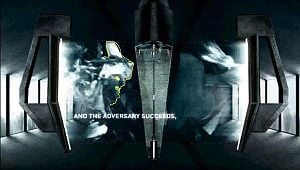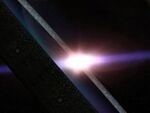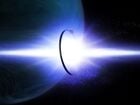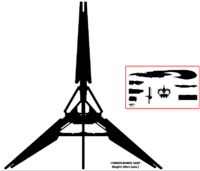Forerunner
From Halopedia, the Halo wiki
Forerunner(s) is the translated Covenant name for an ancient race of beings that built the Halos, The Ark and the Shield World of Onyx. It is the same race that is responsible for the artifacts that were found on Reach, Earth and Sigma Octanus IV. The aforementioned artifacts are our only means of finding information about the Forerunners.
It is argued that the Forerunner may be connected with the Jjaro from Bungie's previous games. The similarities, such as being incredibly technologically advanced, are apparent.
Known History
Next to nothing is known about the history of the Forerunners, save that they were an extremely advanced civilization that inhabited the galaxy hundreds of thousands of years in the past, although it is unknown when they spread around the galaxy.
They achieved an extremely high level of technological advancement, and the evidence of this can be seen scattered throughout the series. The fact that the Halos were created and placed all around the galaxy could be seen as evidence that their empire covered the entire galaxy.
At some point, the Forerunners came into contact with the Flood. It is now known that the Forerunners did not create the Flood. Evidence of this is found in Server 04 on the Halo 3 website where a Forerunner message explains that the Flood are extra-galactic. Seeing the danger they posed to all life in the galaxy, the Forerunners attempted to contain them.
They were able to study them in labs such as the one found in the gas mine on Threshold. Several hundreds, possibly thousands of years after discovering the Flood, they created the Halos as weapons to be used as a last resort against the Flood, wiping out most sentient life with enough biomass to sustain them, killing the Flood through starvation.
Another purpose of the Halos was to contain the Flood so the Forerunners could study them (as explained by 343 Guilty Spark in Halo 1.) They assigned Monitors to each ring with the tasks of maintaining them so that they could be used again in case of future outbreaks.
In the second game, 343 Guilty Spark explains that after exhausting every other strategic option in their struggle against The Flood, the Forerunners activated the Halos about 100,000 years ago[1] (it's important to note that he said "local years", referring years around Threshold, meaning it could have been a much greater or far lesser timespan compared to Earth time, considering that "years" on different planets can vary), destroying themselves along with all other sentient life of sufficient biomass to sustain the Flood within three radii of the galactic center.
Forerunners and Humans?
Both the games and novels contain content that has led to speculation that the Forerunner species is somehow linked to Homo Sapiens of the 26th century. This section is a synopsis of the material leading to this theory. This theory, however, has been disproven due to the opening of Episode 5 of Iris stating that the Forerunners discovered humanity and Earth and built the Ark to protect humanity from the activation of the Halos and protect them from the Flood. In short, the Forerunners are not humans. Although they refer to us as their "children" it is most likely because they saved us and because we are the "keepers of the flame".
(Many believe that humans are part Forerunner, this idea is still debated as Covenant believed the Forerunners to be "Perfect", in "Halo: The Fall Of Reach", Dr.Halsey needed the subjects to be genetically "perfect", this giving the idea that the Forerunner 'gene' sufaces every x-amount of years through thousands of years of filtration)
For one thing, 343 Guilty Spark Takes note of that during the last level of Halo 3, when he says, "Protocol dictates action. I see now that helping you was wrong! You are the child of my makers. Inheritor of all they left behind. You are Forerunner! But this ring is mine. I take no pleasure in doing what must be done." This is because he means that the humans are similar in mentality and spirit to the Forerunners. He also says that they inherited all that they left behind, explaining why he needed a human to find the Index and why Truth needed Johnson to activate the Ark instead of himself. This also means that the Forerunner made the Portal on Earth to protect humanity so they may one day activate the rings and destroy the Flood.
When 343 Guilty Spark talks about activating the installation, he says "Last time you asked me...if it was my choice, would I do it? Having had considerable time to ponder your query, my answer has not changed. We must activate the ring." He also says to the Master Chief "Please stop being human" if Master Chief shoots at him in the Library, possibly implying that the monitor knows what humans are. In the same level 343 Guilty Spark explains to Master Chief that "The installations were built to study and contain the Flood. Their survival as a race depended on it." Shortly after that statement he says to Master Chief "I am glad to see that some survived to reproduce." This shows that the presence of the Master Chief means that the Forerunners survived in some form. He may, however, just be talking about sentient life in general. (Some people have mistaken 343 to be talking about the flood however this would be very bad grammar and poor story plot, two things that bungie would not allow considering its track record.)
The Halo installations seen in the games and novels also appear to have the same gravity and atmosphere as Earth; it would make sense that the Forerunner would attempt to make the Halos similar to their reclaimer's homeworld. The monitor asks "Why would you hesitate to do what you've already done?", after the Master Chief chooses not to activate Halo. Also linking Forerunners and humans together, the Forerunners died 100,000 years ago, which, ironically, was around the same time the ancient homo-sapiens started to move out of Africa, thus perhaps linking the fall of the forerunners, and the rise of the humans.
On many of the walls of the Forerunner structures there are geometrical and mathematical designs and patterns. If you look closely at certain walls you will find lines that greatly resemble a human face. It is easiest to find this on The Silent Cartographer, although they are also found on almost every level in Halo 1.
In the opening cutscene of Two Betrayals, after Cortana explains how Halo works, Guilty Spark says, "But you already knew that. I mean, how couldn't you?" This could indicate that he believes that the Forerunners have passed their knowledge on.
Late in the first Halo game, during a cutscene in the level "The Maw", 343 Guilty Spark is shown pulling data out of the Pillar of Autumn's data core while saying, "You can't imagine how exciting this is, to have a record of all of our lost time! Human history, is it? Fascinating. Oh I shall enjoy every moment of its categorization...", which may be another link between humans and Forerunners.
The fact that only humans, or Reclaimers, as the monitor refers to them can activate the rings. This is shown near the end of Halo 2 when Tartarus forced Miranda Keyes into placing the Index into Halo's control systems, rather than do it himself.
The novels also appear to offer hints about the link between humans and Forerunners. Several Spartans recognize Forerunner symbols but they can't quite place them, which may mean that the information is deep in the subconscious. In Halo: The Flood, the Master Chief just "knows" how to activate the light bridge, for some strange reason; the same appears true when he activates the Silent Cartographer. In Halo: First Strike, the Spartans just "know" how to operate the Wraith tanks. If the Covenant did indeed salvage technology from the Forerunners, then that might explain it.
In Halo: Ghosts of Onyx at one point one of the Spartan-III's is challenged by one of the sentinels in Latin. This could lead to more speculation that humans forgot the knowledge passed down by the forerunner's. Halo 3 may also offer more clues or explanations. In the game's E3 announcement trailer, the vast Forerunner object the Master Chief observes resembles an earlier sketch that says "Ark" and Dervish, the early name for the Arbiter. Bungie has confirmed that the object Master Chief witnesses is the Ark, iris. Possible other hints include Cortana's monologue in the second underwater elevator during the Halo 2 Level- "Regret". She states that Regret's fleet had been ten times smaller than the Fleet that glassed Reach, that they had come to find something, such as the Ark.
In Halo 3: The Cradle of Life, a human elder of his tribe gets up every morning and watches the "gods" (presumed Forerunners) make their "machines". The "machine" is the same Artifact that was in the Halo 3 Announcement Trailer.
However, Server 05 of Iris shows the Forerunners discovering Earth, and wanting to protect the inhabitants, humanity. However, in Halo 3, messages sent between a mysterious '"Librarian" Forerunner and it's lover, a Forerunner known as Didact, state that the Forerunners came across the human race at the end of their centuries-long war with the Flood, and the Librarian, along with others, considered the humans "special." The Librarian stayed behind on Earth when the Halos were activated. The Librarian has also been shown to have had a great deal of power in the Forerunner society, deciding when access to the Ark would be closed, and so might have chosen the human species to be recognized Reclaimers by Forerunner constructs.
The Terminals
In Halo 3, there are several computer monitors which are hidden in the Ark, each providing valuable clues to the backstory.
Planet Earth was the last planet to be investigated for sentient life by Librarian (a Forerunner). Upon investigation she did discover sentient life. She indexed them, and in her final hour she quickly constructed a portal to the Ark, and sent them there (Librarian had spent hundreds of years indexing every living being in the universe).
The Forerunners established a defensive line in space against the Flood, Librarian crossed this line when she went on her quest to index everything. The Flood continued to spread, spiraling outward, the most logical thing to do: expanding. Librarian's lover, 'Didact', was concerned about her safety, and kept begging her to come home (Ark), but Librarian remained strong and pursued her near-impossible quest to save all life.
Eventually, Didact couldn't remain idle any longer, and pursued Librarian with a fleet. Sympathetic for Librarian and her ideals, he sought for a plan to defeat the Flood without firing the Halos, so life would be spared and Librarian's quest could be ended, forcing her to return home.
Didact then created an absolute super AI: Mendicant Bias. This AI would assist him greatly in battle against the Flood, the strategy was to lure the Flood masses into battle, while Mendicant Bias, with his super intelligence, would engage a mass of Flood forces, but also coordinate a sneak attack straight at the Flood core: the Gravemind.
Unfortunately, this plan could never succeed, as Librarian pointed out the 'thing' would simply retract and muster it's forces, it would do everything for self-preservation. Didact then used this 'retraction behavior' to buy time, so he could go and retrieve Librarian and take her home. But Mendicant Bias, the AI, betrayed him. He returned with the Flood, and destroyed the waiting rescue party, separating Didact from Librarian. Didact was then forced to retreat.
Librarian then witnessed a disturbing behavior from the Flood; they were no longer spiraling outwards. They were moving in a straight line, heading for the Maginot Line (Forerunner defensive line); going straight for the Ark. In its betrayal, Mendicant Bias had told the Gravemind of the Forerunner's plans, which would be successful in eradicating the Flood.
To counter Mendicant Bias, Didact quickly constructed 'Offensive Bias' to hold him off.
When the fleet had returned, Librarian remotely blew up their Keyships (ships that were able to gain access to the Ark through distortion of time and space), effectively locking her out from the Ark, but the Flood also.
Librarian remained on Earth, saying to Didact that she had found a nice mountain where she could spend her final seconds, afterwards she had to stop communicating with Didact, as the Flood had found every comm channel and mocked her with their laughter.
Begging him to fire the Array (Halos), Didact finally did. He had to go on the Great Journey without his beloved.
See The Reclaimer for more information on the links between the Forerunner and humans.
Forerunner Weaponry
Forerunner constructs use a wide variety of weapons. The Sentinels wield energy beams, used mainly for fighting the Flood. Sentinel Majors have a more powerful and accurate version of the beam, which sports superior energy output at the cost of overheating issues. All varieties of these Sentinel Beams can be wielded by certain Covenant and Human infantry. Meanwhile, Enforcers are equipped with multiple packs of small rocket-like explosives launched over the top of their shield as well as weapons similar to Needlers, which fire clusters of smaller red crystals at a faster rate, used mainly against infantry at close range. These mammoth constructs also seem to be able to lift vehicles using some sort of magnetic grapple, before crushing even tank-sized objects between their massive 'arms'. The Constructors repair beam can also be considered a weapon. The Sentinels of Onyx had significantly more powerful weaponry. They were described as spheres surrounded by three floating "booms" and had powerful energy shields that would suddenly "pop" into place in order to deflect fast-moving fire. The shields could be tricked by dense, slower moving objects, such as rocks, which Team Saber used to destroy one of the Sentinels. Their energy weapons, described as a single golden beam, charged slowly, but when fired, could melt straight through the armor of the Spartan III's. These Sentinels also had the ability to combine energies, for different purposes, such as stronger combat abilities, or excavation purposes. Their powers are exponentially increased by this combination, and enough of them were able to combine to easily destroy two Covenant destroyers.
Forerunner Technology
Forerunner technology is highly advanced. They have managed to create solid surfaces through solid "light" energy, construct a Halo-wide Teleportation Grid, and have utilized several advanced devices such as The Index, Phase Pulse Generators, Markers, Containment Facilities, Sentinel Beams, Sentinel Launchers, Anti-Gravity Gondolas, Sentinel Production Facilities, Energy Cores, Gas Containers, Conveyor Belt, Piston, and the Plug Lock. The Monitors hacking beam can also be considered a Forerunner technology. The Halo rings themselves, as well as the Micro-Dyson sphere at the center of the artificial world Onyx, are, above all others, the most significant pieces of technology. The planet Onyx in particular demonstrates both their ability for engineering on a grand scale, and their near transcendent grasp of "Slipspace" technology.
Forerunner Art and Architecture
Forerunner architecture is noted mainly for its geometric style and vast scale. It tends to be very elaborate, with numerous extrapolations of the basic design of a structure, all purely decorative. They use complex geometric shapes and hardly ever use anything but straight lines in their design.
The Forerunners tend to decorate the interiors of their structures with a complex web of engraved straight lines.
The fact that the Forerunners were able to build such giant structures as the Control Rooms, Libraries, the Temple, the Sentinel Wall, the planet Onyx and even Halo itself shows that they likely had very sophisticated methods of building.
Forerunner Glyphs and Symbols
|
Forerunner Numbers:
|
Forerunner Glyphs:
File:CFsymbols.jpg Forerunner glyphs. |
Forerunner Iris Icon:
|
Fortress Worlds
- Main article: The Halos
Installation 04
Installation 05
- Control Room
- The Library
- Quarantine Zone
- Sentinel Wall
- The Temple
- Flood Research Facilities
- Relay Station
- Sentinel Production Facility
Installation 04, and 05 are the only two Fortress Worlds yet discovered in the Halo Universe. Yet looking at the Monitor naming scheme (variants of 7, none the less), they offer a clue as to the existence of other Halos.
Looking at the number in 343 Guilty Spark, 343 is seven to the third power. Seven being a number seen frequently in Bungie games and mythology. The number "2401", from 2401 Penitent Tangent, is seven to the fourth power.
When the numbers of each Monitor are examined, a pattern emerges: each seems to be seven raised to the power of the installation number minus one; therefore this table to the right can be established.
The first three numbers across from installation 07 is "117" which of course is John's SPARTAN number( SPARTAN- 117 ). And the infamous "7" with Bungie is apparent in Installation 07
Forerunner Installations
- The Ark - Controls all halo installations.
- Onyx - A UNSC controlled world, inhabited by sentinels.
Forerunner Constructs
- Monitors - Floating AIs responsible for maintenance of Halo worlds.
- Enforcers - Enforce the Monitor's will.
- Sentinels - Responsible for guarding a Halo.
- Sentinel Majors - An upgraded Sentinel.
- Onyx Sentinels - Powerful, adaptive Sentinel of Onyx.
- Constructors - Responsible for the repair of a Halo.
Forerunner Artifacts and Technology
See also Technology
Related Links
Internal Links
External Links
- Forerunner Symbology - An article on Forerunner symbols.
Sources
Trivia
- The Forerunners are often compared to the Jjaro from the marathon series.
- The exact origins of the Forerunners are a complete mystery, and are likely intentionally so by Bungie. Whether they were human or not, sources seem to support all theories, making untangling this web of information a difficult process.



